Mises, Ludwig von. Human Action: A Treatise on Economics
Подождите немного. Документ загружается.

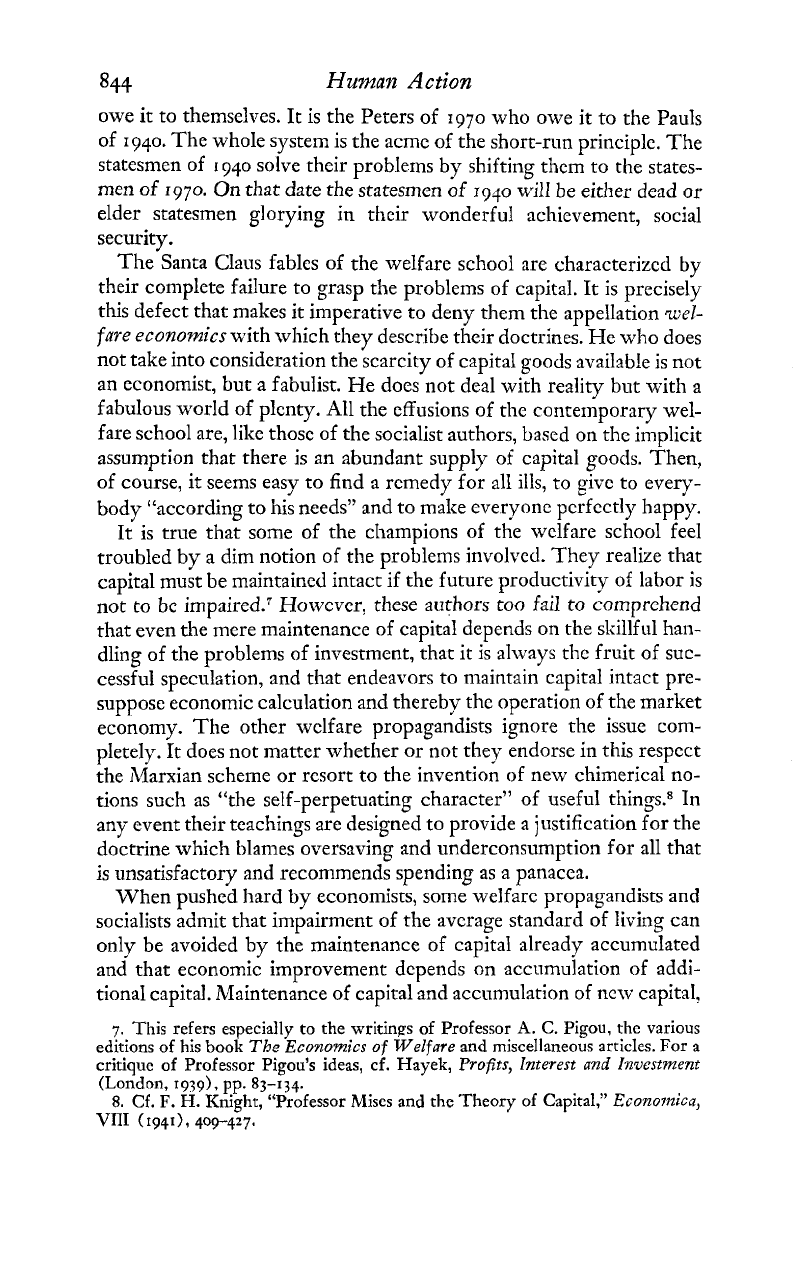
844
Human
Action
owe
it
to themselves. It is the Peters of 1970 who owe it to the Pauls
of 1940. The whole system is the acme of the short-run principle. The
statesmen of
I
940 solve their problems by shifting them to the states-
men
of
1970. On that date the statesmen
of
rgqo
will
be
either dead
or
elder statesmen glorying in their wonderful
achievement,
social
security.
The Santa Clam fables of the welfare school are characterized
by
their con~plete failure to grasp the problems of capital. It is precisely
this defect that makes it imperative to deny them the appellation
we/-
fare
economics
with which they describe their doctrines. He who does
not take into consideration the scarcity of capital goods available is not
an economist, but a fabulist. He does not deal with reality but with a
fabulous world of plenty. All the effusions of the contemporary wel-
fare school are, like those of the socialist authors, based on the implicit
assumption that there is an abundant supply of capital goods. Then,
of course, it seems easy to find a rcmedy for all ills, to give to every-
body "according to his needs" and to make everyone perfectly happy.
It is true that some of the champions of the welfare school feel
troubled by a dim notion of the problems involved. They realize that
capital must be maintained intact if the future productivity of labor is
not to be irn~aired.~ However, these authors too fail to
comprehend
that even the mere maintenance of capital depends on the skillful han-
dling of the problems of investment, that it is always the fruit of suc-
cessful speculation, and that endeavors to maintain capital intact pre-
suppose economic calculation and thereby the operation of the market
economy. The other welfare propagandists ignore the issue com-
pletely. It does not matter whether or not they endorse in this respect
the Marxian scheme or resort to the invention of new chimerical no-
tions such as "the self-perpetuating character" of useful thing~.~ In
any event their teachings are designed to provide a justification for the
doctrine which blames oversaving and underconsumption for all that
is unsatisfactory and recommends spending as a panacea.
When pushed hard by economists, some welfare propagandists and
socialists admit that impairment of the average standard of living can
only be avoided by the maintenance of capital already accumulated
and that economic improvement depends on accumulation of addi-
tional capital. Maintenance of capital and accumulation of
ncw
capital,
7.
This refers especially to the writings of Professor
A.
C.
Pigou, thc various
editions of his book
The
Economics of Welfare
and miscellaneous articles. For a
critique of Professor Pigou's ideas, cf. Hayek,
Profits,
Interest and Investment
(London,
1939).
pp.
83-134.
8.
Cf.
F.
H.
Knight, "Professor Miscs and the Theory of Capital,"
Economica,
VIII
(1941)* 409-427,

Welfare Principle Versus Market Principle
845
they say, will henceforth be a task of government. They will no
longer be left to the selfishness of individuals, exclusively concerned
with their own enrichment and that of their families; the authorities
will deal with them from the point of view of the common weal.
The crux of the issue lies precisely in the operation of selfishness.
Under the system of inequality this selfishness impels a man to save
and always to invest his savings in such a way as to
fill
best the most
urgent needs of the consumers. Cnder the system of equality this
motive fades. The curtaiIment of consumption in the immediate future
is a perceptible privation, a blow to the individuals' selfish aims. The
increment in the supply available in more distant periods of the future
which is expected from this immediate privation is less recognizable
for the average intellect. Moreover, its beneficial effects are, under a
system of public accumulation, so thinly spread out that they hardly
appear to a man as an appropriate compensation for what he foregoes
today. The welfare school blithely assumes that the expectation that
the fruits of today's saving
will
be reaped equally by the whole of the
future generation will turn everybody's selfishness'toward more sav-
ing. Thus they fall prey to a corollary of Plato's illusion that prevent-
ing people from knowing which children's parents they are will in-
spire them with parental feelings toward all younger people.
It
would
have been wise if the welfare school had been mindful of Aristotle's
observation that the result will rather be that all parents will be equally
indifferent to all ~hildren.~
The problem of maintaining and increasing capital is insoluble for
a socialist system which cannot resort to economic calculation. Such
a
socialist commonweaIth lacks any method of ascertaining whether
its capital equipment
is
decreasing or increasing. But under intenen-
tionism and under
a
socialist system which is still in a position to resort
to economic calculation on the basis of prices established abroad,
things are not so bad. Here it is at least possible to comprehend what
is going on.
If
such a country is under
a
democratic government, the problems
of capital preservation and accumulation of additional capital become
the main issue of political antagonisms. There will be demagogues to
contend that more could be dedicated to current consumption than
those who happen to be in power or the other parties are disposed
to
allow. They will always be ready to declare that "in the present
emergency" there cannot he any question of piling
up
capital for
later days and that, on rhe contrary, consumption of a part of the
9.
Cf. Aristotle,
Politics,
Bk.
11,
chap.
iii
in
The B~sic
Works
of
Aristotle,
ed.
R,
McKeon
(New
York,
I
945),
pp.
I I
48
f.
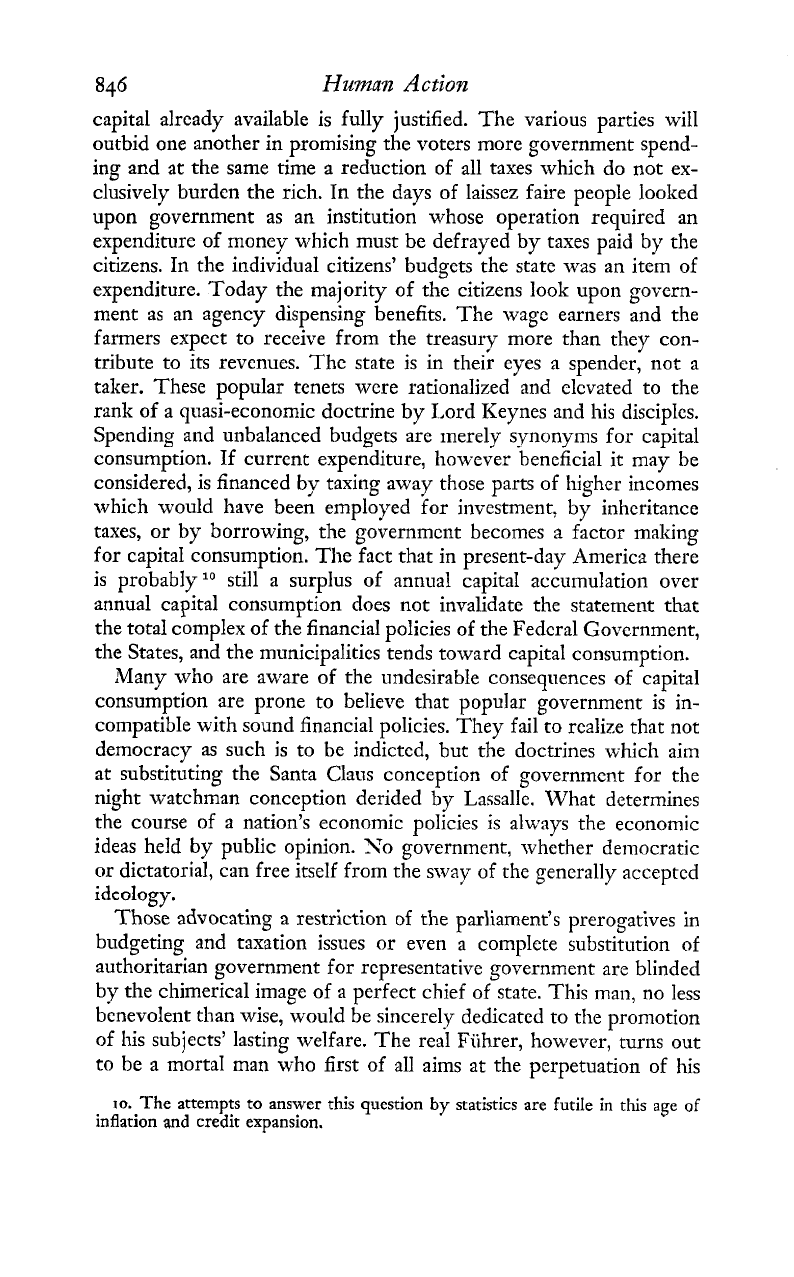
846
Human
Action
capital already available is fully justified. The various parties will
outbid one another in promising the voters more government spend-
ing and at the same time a reduction of all taxes which do not ex-
clusively burden the rich.
In
the days of laissez faire people looked
upon government as an institution whose operation required an
expenditure of money which must be defrayed by taxes paid by the
citizens.
In
the individual citizens' budgets the state was an item of
expenditure. Today the majority of the citizens look upon govern-
ment as an agency dispensing benefits. The wagc earners and the
farmers expect to receive from the treasury more than they con-
tribute to its revenues. The state is in their eyes a spender, not a
taker. These popular tenets were rationalized and elcvated to the
rank of a quasi-economic doctrine by Lord Keynes and his disciples.
Spending and unbalanced budgets are merely synonyms for capital
consumption. If current expenditure, however beneficial it may be
considered, is financed by taxing away those parts of higher incomes
which would have been employed for investment. by inheritance
taxes, or by borrowing, the governmcnt becomes a factor malting
for capital consumption. The fact that in present-day America there
is probably
lo
still a surplus of annual capita1 accumulation over
annual capital consumption does not invalidate the statement that
the total complex of the financial policies of the Federal Government,
the States, and the municipalities tends toward capital consumption.
Many who are aware of the undesirable consequences of capital
consumption are prone to believe that popular government is in-
compatible with sound financial policies. They fail to realize that not
democracy as such is to be indicted,
but
the doctrines which aim
at substituting the Santa Claus conception of government for the
night watchman conception derided by Lassalle. What determines
the course of a nation's economic policies is always the economic
ideas held by public opinion.
90
government, whether democratic
or dictatorial, can free itself from the sway of the generally accepted
ideology.
Those advocating a restriction of the parliament's prerogatives in
budgeting and taxation issues or even a complete substitution of
authoritarian government for representative government are blinded
by the chimerical image of a perfect chief of state. This man, no less
benevolent
than wise, would be sincerely dedicated to the promotion
of his subjects' lasting weIfare. The real Fiihrer, however, turns out
to be a mortaI man who first of a11 aims at the perpetuation of his
10.
The attempts to answer this question
by
statistics are futile
in
this
age
of
inflation and credit expansion.
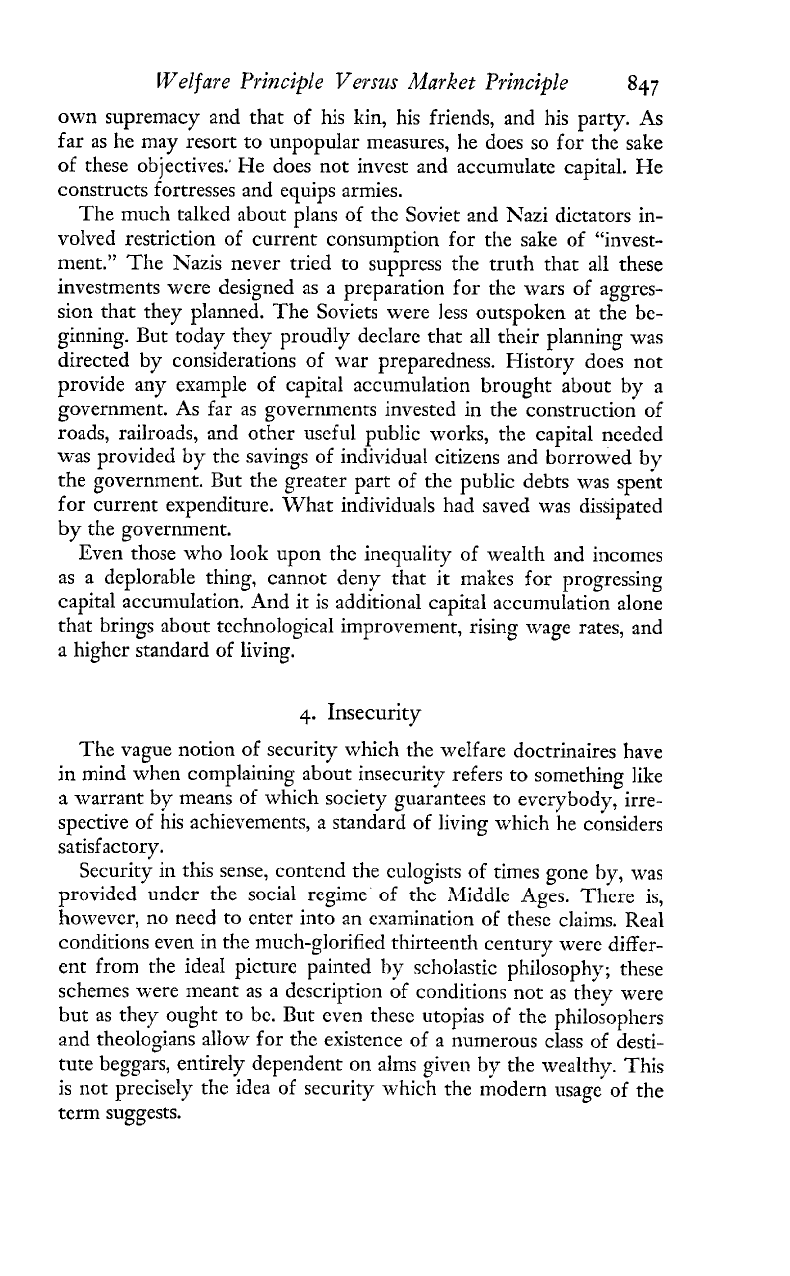
Welfare Principle
Versus
Market Principle
847
own supremacy and that of his kin, his friends, and his party. As
far as hc may resort to unpopular measures,
he
does so for the sake
of these objectives.' He does not invest and accumulate capital. He
constructs fortresses and equips armies.
The
much talked about plans of the Soviet and Nazi dictators in-
volved restriction of current consumption for the sake of "invest-
ment." The Nazis never tried to suppress the truth that all these
investments were designed as a preparation for the wars of aggres-
sion that they planned. The Soviets were less outspoken at the be-
ginning. But today they proudly declare that all their planning was
directed by considerations of war preparedness. History does not
provide any example of capital accumulation brought about by a
government. As far as governments invested in the construction of
roads, railroads, and other uscful public works, the capital needed
was provided by the savings of individual citizens and borrowed
b\;
the government. But the greater part of the public debts was spe&
for current expenditure. What individuals had saved was dissipated
by the government.
Even those who look upon the inequality of wealth and incomes
as a deplorable thing, cannot deny that it makes for progressing
capital accumulation. And it is additional capital accumulation alone
that brings about technological improvement, rising wage rates, and
a higher standard of living.
4.
Insecurity
The vague notion of security which the weIfare doctrinaires have
in mind when complaining about insecurity refers to something like
a warrant b\; means of which society guarantees to
everybody,
irre-
spective of his achievements, a standard of living which he considers
satisfactory.
Security in this sense, contend the eulogists of times gone by, was
provided
uiidcr
+I.,.
Llbc
>Ad!
---...
141111;
---.--
of the Middle
Ages.
There
is,
however, no need to enter into
an
examination of thew claims. Real
conditions even in the much-glorified thirteenth century were differ-
ent from the idea1 picture painted
by
scholastic philosophy; these
schemes were meant as a description of conditions not as they were
but as they ought to bc. But even these utopias of the philosophers
and theologians allow for the existence of a numerous class of desti-
tute beggars, entirely dependent on alms given by the wealthy. This
is not precisely the idea of security which the modern usage of the
term suggests.
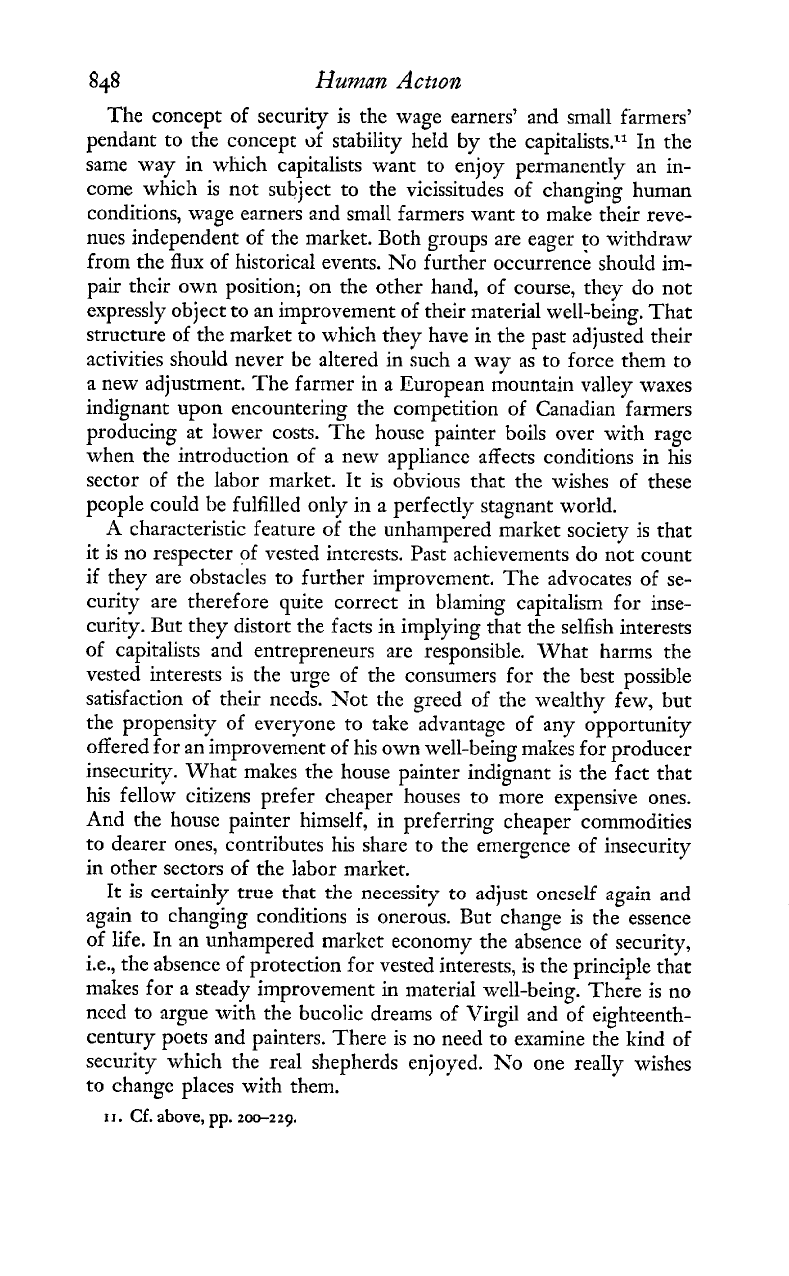
848
Human
Actzon
The concept of security is the wage earners' and small farmers'
pendant to the concept of stability heId by the capita1ists.l1 In the
same way in which capitalists want to enjoy permanently an in-
come which is not subject to the vicissitudes of changing human
conditions, wage earners and small farmers want to make their reve-
nues independent of the market. Both groups are eager to withdraw
from the flux of historical events. No further occurrcnck should im-
pair their own position; on the other hand, of course, they do not
expressly object to an improvement of their material well-being. That
structure of the market to which they have in the past adjusted their
activities should never be altered in such a way as to force them to
a new adjustment. The farmer in a European mountain valley waxes
indignant upon encountering the competition of Canadian farmers
producing at iower costs. The house painter boils over with rage
when the introduction of a new appliance affects conditions in his
sector of
the
labor market. It is obvious that the wishes of these
people could be fulfilled only in a perfectly stagnant world.
A
characteristic feature of the unhampered market society is that
it is no respecter of vested interests. Past achievements do not count
if they are obstacles to further improvement. The advocates
of
se-
curity are therefore quite correct in blaming capitalism for inse-
curity. But they distort the facts
in
implying that the selfish interests
of capitalists and entrepreneurs are responsible. What harms the
vested interests is the urge of the consumers for the best possible
satisfaction of their needs. Not the greed of the wealthy few, but
the propensity of everyone to take advantage of any opportunity
offered for an improvement of his own well-being makes for producer
insecurity. What makes the house painter indignant
is
the fact that
his fellow citizens prefer cheaper houses to more expensive ones.
And the house painter himself, in preferring cheaper commodities
to dearer ones, contributes his share to the emergence of insecurity
in other sectors of the labor market.
It
is
certaidjr
true
that
the
necessity
to
adjus:
oneself
again
aid
again to changing conditions is onerous. But change is the essence
of life. In an unhampered market economy the absence of security,
i.e., the absence of protection for vested interests, is the principle that
makes for a steady improvement in material well-being. There is
no
need to argue with the bucolic dreams
of
Virgil and of eighteenth-
century poets and painters. There is no need to examine the kind of
security which the real shepherds enjoyed. No one redly wishes
to change places with them.
I
1.
Cf.
above,
pp.
~004~9.
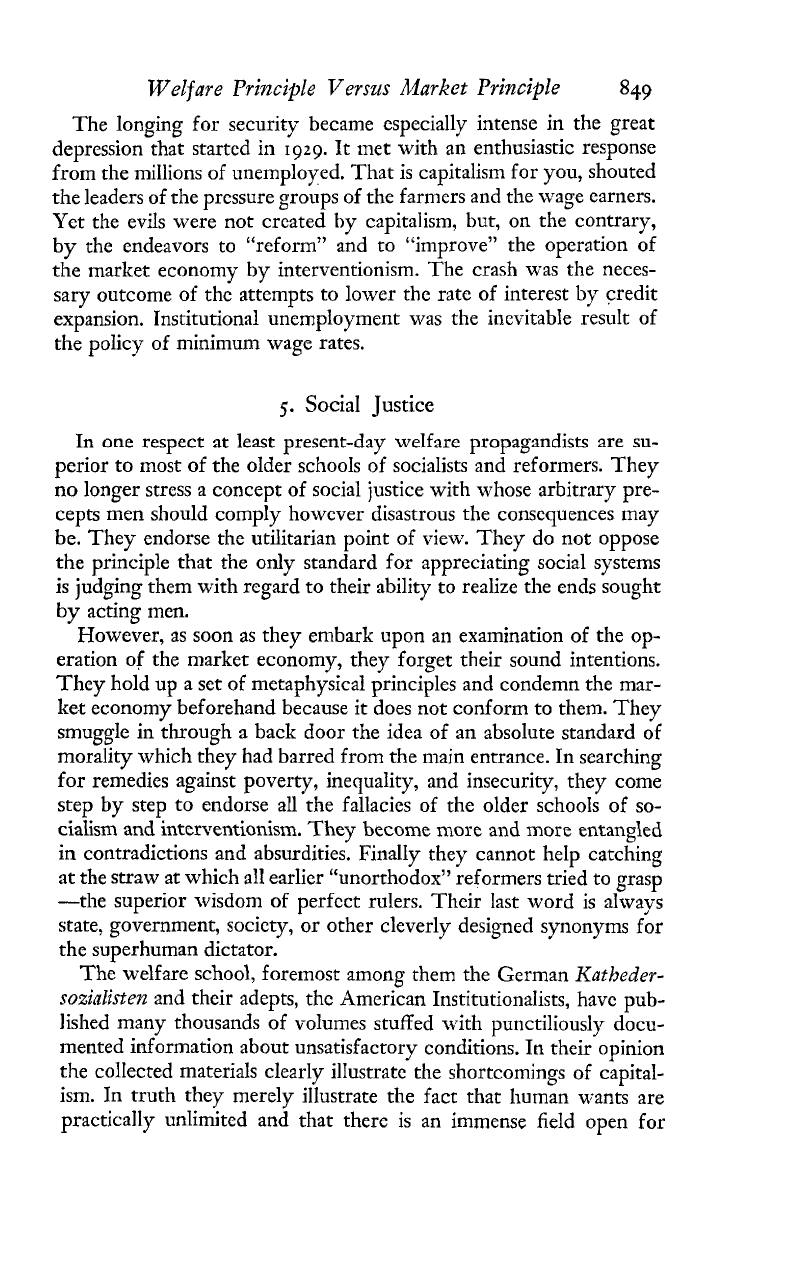
Welfare Principle Versus Market Principle
849
The longing for security became especially intense in the great
depression that started in
1929.
It met with an enthusiastic response
from the millions of unemployed. That is capitalism for you, shouted
the leaders of the pressure groups of the farmers and the wage earners.
Yet the evils were not created by capitalism, but, on the contrary,
by the endeavors to "reform" and to "improve" the operation of
the market economy by interventionism. The crash was the neces-
sary outcome of the attempts to lower the rate of interest by credit
expansion. Institutional unemployment was the inevitable result of
the policy of minimum wage rates.
5.
Social
Justice
In one respect at least present-day welfare propagandists are su-
perior to most of the older schools of socialists and reformers. They
no longer stress a concept of social justice with whose arbitrary pre-
cepts men should comply however disastrous the consequences may
be. They endorse the utilitarian point of view. They do not oppose
the principle that the only standard for appreciating social systems
is judging them with regard to their ability to realize the ends sought
by
acting men.
However, as soon as they embark upon an examination of the op-
eration of the market economy, they forget their sound intentions.
They hold up a set of metaphysical principles and condemn the mar-
ket economy beforehand because it does not conform to them. They
smuggle in through a back door the idea of an absolute standard of
morality which they had barred from the main entrance. In searching
for remedies against poverty, inequality, and insecurity, they come
step
by
step to endorse all the fallacies of the older schools of so-
cialism
and interventionism. They become more
and
more entangled
in contradictions and absurdities. Finally they cannot help catching
at the straw at which all earlier "unorthod~x'~ reformers tried to grasp
-the superior wisdom of perfect rulers. Their last word is always
state, government, society, or other cleverly designed synonyms for
the superhuman dictator.
The welfare school, foremost among them the German
Katheder-
sozinlisten
and their adepts, the American I~lstitutionalists, have pub-
lished many thousands of volumes stuffed with punctiliously docu-
mented information about unsatisfactory conditions. In their opinion
the colIected materials clearly ilIustratc the shortcomings of capital-
ism. In truth they merely illustrate the fact that human
u.
,ants are
practically unlimited and that there is an immense field open for
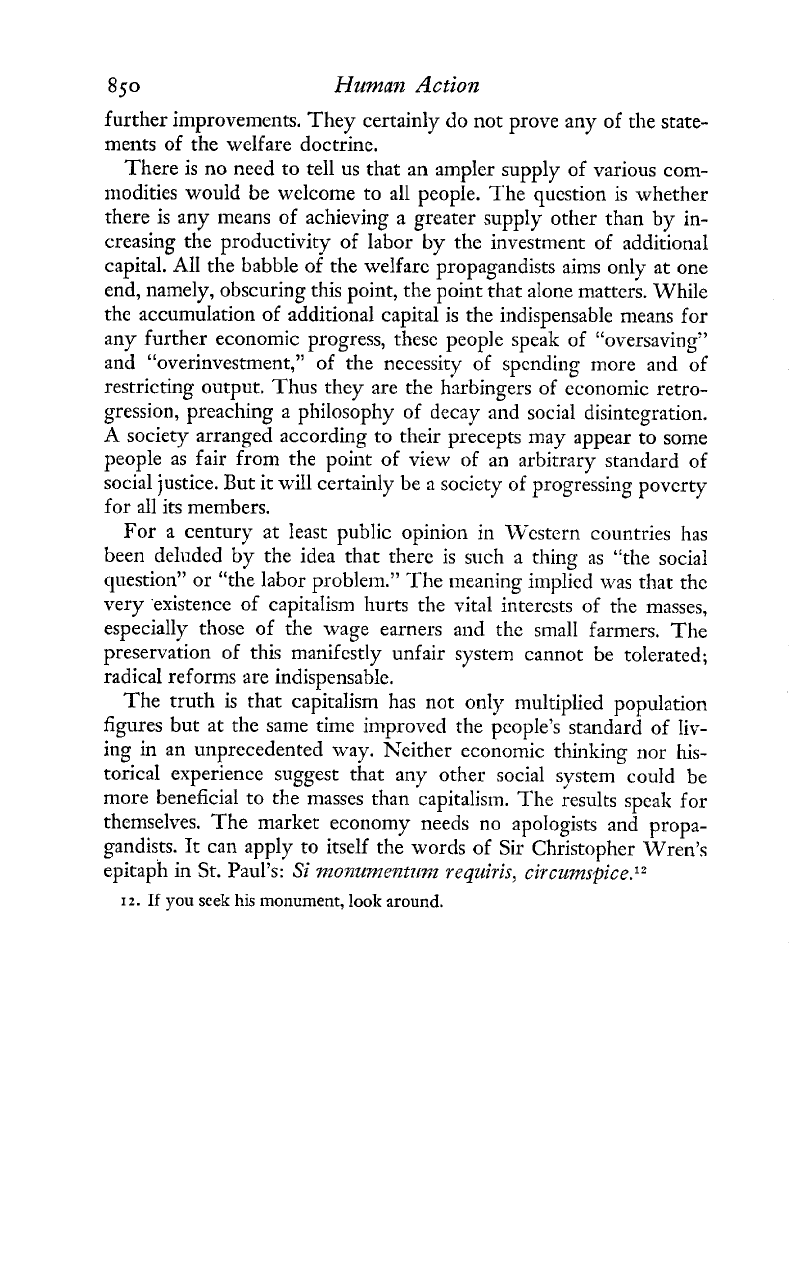
850
Human
Action
further improvements. They certainly do not prove any of the state-
ments of the welfare doctrine.
There is no need to tell us that an ampler supply of various com-
modities would be welcome to all people. The question is whether
there is any means of achieving a greater supply other than by in-
creasing the productivity of labor by the investment of additional
capital. A11 the babble of the welfarc propagandists aims only at one
end, namely, obscuring this point, the point that alone matters. While
the accumulation of additional capital is the indispensable means for
any further economic progress, these people speak of "oversaving"
and "overinvestment," of the necessity of spcnding more and of
restricting output. Thus they are the h&bingers of economic retro-
gression, preaching a philosophy of decay and social disintegration.
A
society arranged according to their precepts may appear to some
people as fair from the point of view of
an
arbitrary standard of
social justice.
But
it wiIl certainly be a society of progressing poverty
for all its members.
For a century at Ieast public opinion in Western countries has
been deluded
by
the idea that there is such a thing as "the social
question" or "the labor problem." The meaning implied was that the
very existence of capitaIism hurts the vital interests of the masses,
especially those of the wage earners and the small farmers. The
preservation of this manifestly unfair system cannot be
tolerated;
radical reforms are indispensable.
The truth is that capitalism has not only multiplied population
figures but at the same time improved the people's standard of Iiv-
ing
in an unprecedented way. Neither economic thinking nor his-
torical experience suggest that any other social system corlld be
more beneficial to the masses than capitalism. Thc results speak for
themselves. The market economy needs no apologists and propa-
gandists. It can apply to itself the words of Sir Christopher Wren's
epitaph in
St.
Paul's:
Si
nzonzmzentmz
requiris,
circu7nspice.l"
I
2.
If
you
seek
his monument, look around.
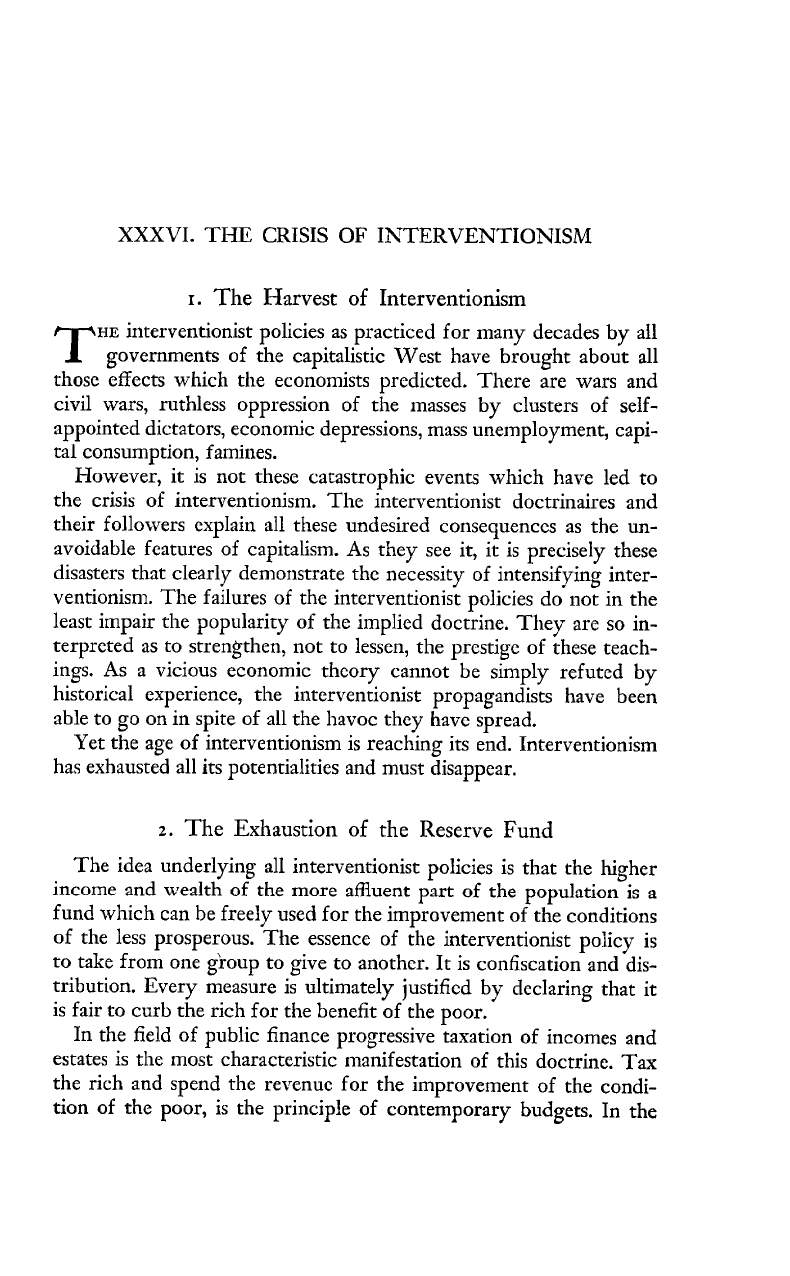
XXXVI. THE CRISIS
OF
INTERVENTIONISM
r.
The
Harvest of Interventionism
T
HE
interventionist: policies as practiced for many decades by all
governments of the capitalistic West have brought about all
those effects which the economists predicted. There are wars and
civil wars, ruthless oppression of the masses by clusters of self-
appointed dictators, economic depressions, mass unemployment, capi-
tal consumption, famines.
However, it
is
not these catastrophic events which have led to
the crisis of interventionism. The interventionist doctrinaires and
their followers explain all these undesired consequences as the un-
avoidable features of capitalism. As they see it, it is precisely these
disasters that clearly denlonstrate thc necessity of intensifying inter-
ventionism. The failures of the interventionist policies do not in the
least impair the popularity of the implied doctrine. They arc so in-
terpreted as to strengthen, not to lessen, the prestige of these teach-
ings. As a vicious economic thcory cannot be simply refuted by
historical experience, the interventionist propagandists have been
able to go on in spite of all the havoc they have spread.
Yet the age of interventionism is reaching its end. Interventionism
has exhausted all its potentialities and must disappear.
2.
The Exhaustion of the Reserve
Fund
The idea underlying all interventionist policies is that the higher
inromp
and
wea!th
nf
the
mere
&luefit
prt
sf
the
pepu!adm
is
a
- - -
-
-
- - - -
fund which can be freely used for the improvement of the conditions
of the less prosperous. The essence of the interventionist policy is
to take from one group to give to another. It is confiscation and dis-
tribution. Every measure is ultimately justified by declaring that it
is fair to curb the rich for the benefit of the poor.
In the field of public finance progressive taxation
of
incomes and
estates is the most characteristic
manifestation
of this doctrine. Tax
the rich and spend the revenue for the improvement of the condi-
tion
of
the poor, is the principle of contemporary budgets. In the
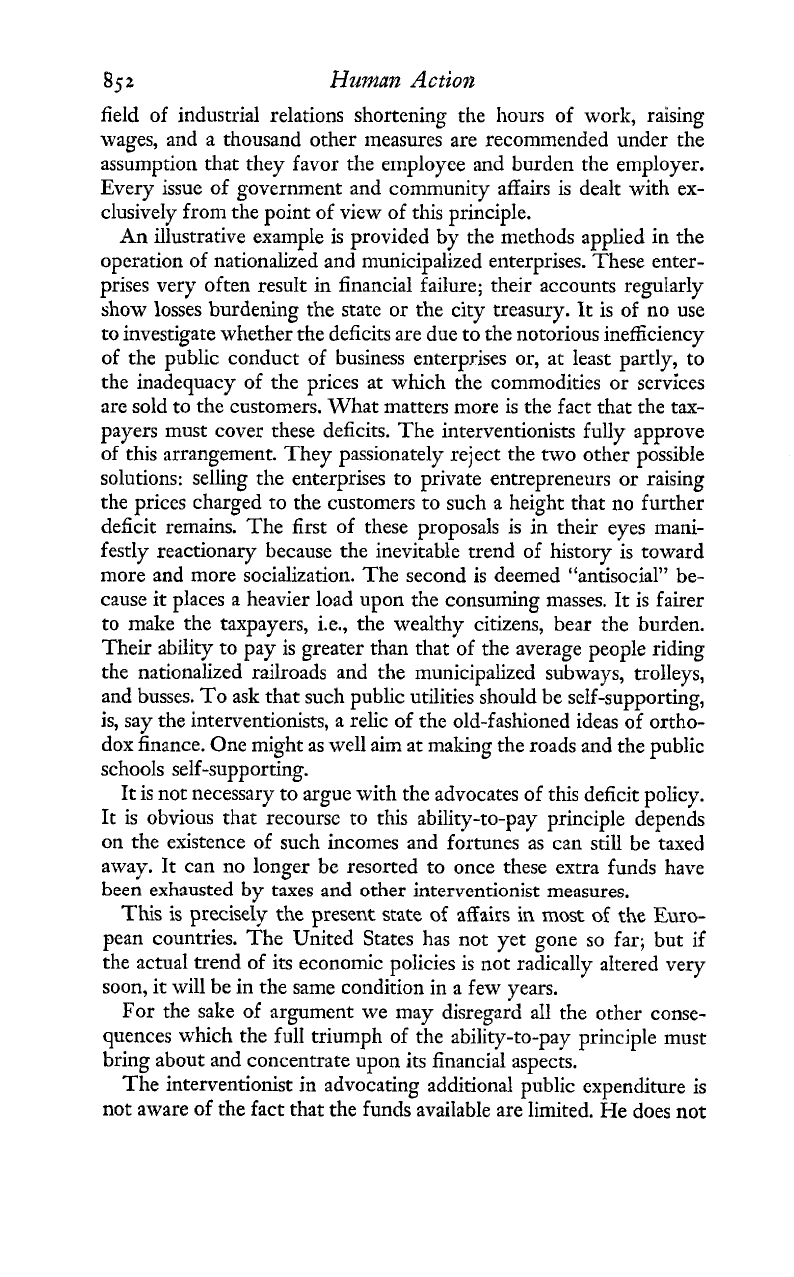
852
Human
Actio~
field of industrial relations shortening the hours of work, raising
wages, and a thousand other measures are recommended under the
assumption that they favor the employee and burden the employer.
Every issue of government and community affairs is dealt with ex-
clusively from the point of view of this principle.
An illustrative example is provided by the methods applied in the
operation of nationalized and municipalized enterprises. These enter-
prises very often result in financial failure; their accounts regularly
show losses burdening the state or the city treasury.
It
is of no use
to investigate whether the deficits are due to the notorious inefficiency
of the public conduct of business enterprises or, at least partly, to
the inadequacy of the prices at which the commodities or services
are sold to the customers. What matters more is the fact that the tax-
payers must cover these deficits. The interventionists fully approve
of this arrangement. They passionately reject the two other possible
solutions: selling the enterprises to private entrepreneurs or raising
the prices charged to the customers to such a height that no further
deficit remains. The first of these proposals is in their eyes mani-
festly reactionary because the inevitable trend of history is toward
more and more socialization. The second is deemed "antisocial" be-
cause
it
places a heavier load upon the consuming masses. It is fairer
to make the taxpayers, i.e., the wealthy citizens, bear the burden.
Their ability to pay is greater than that of the average people riding
the nationalized railroads and the municipalized subways, trolleys,
and busses. To ask that such public utilities should be self-supporting,
is, say the interventionists, a relic of the old-fashioned ideas of ortho-
dox finance. One might as well aim at making the roads and the public
schools self-supporting.
It is not necessary to argue with the advocates of this deficit policy.
It is obvious that recourse to this ability-to-pay principle depends
on the existence of such incomes and fortunes as can still be taxed
away. It can no longer be resorted to once these extra funds have
been exhausted
by
taxes and other interventionist measures.
This is precisely the present state
of
affairs
in
most
of
the
Euro-
pean countries. The United States has not yet gone so far; but if
the actual trend of its economic policies is not radically altered very
soon, it will be in the same condition in a few years.
For the sake of argument we may disregard aI1 the other conse-
quences which the fulI triumph of the ability-to-pay principle must
bring about and concentrate upon its financial aspects.
The interventionist in advocating additional public expenditure is
not aware of the fact that the funds available are limited. He does not
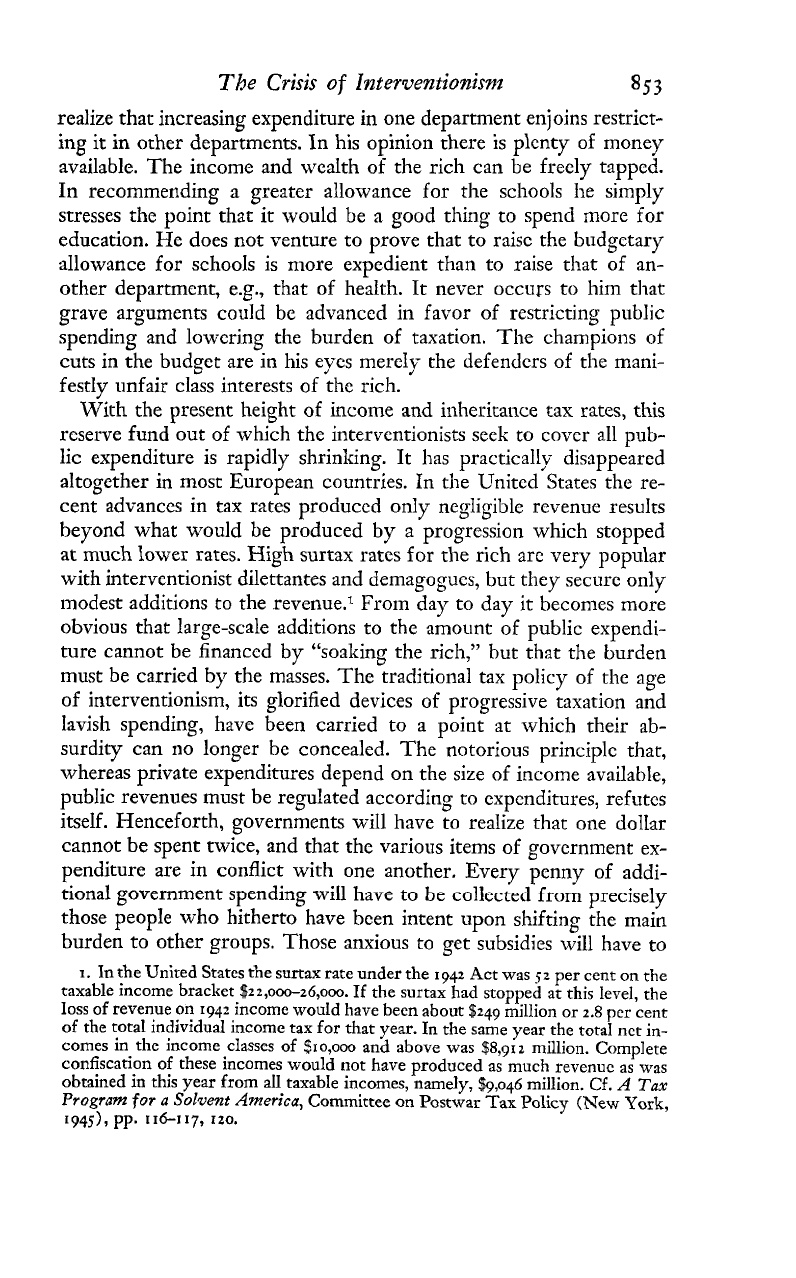
The Crisis
of
Interventionism
853
realize that increasing expenditure in one department enjoins restrict-
ing
it
in
other departments. In his opinion there is plenty of money
available. The income and wealth of the rich can be freely tapped.
In recommending a greater allowance for the schools he simply
stresses the point that it would be a good thing to spend more for
education. He does not venture to prove that to raise the budgetary
allowance for schools is more expedient than to raise that of an-
other department, e.g., that of health. It never occurs to him that
grave arguments could be advanced in favor of restricting public
spending and lowering the burden of taxation. The champions
of
cuts in the budget are in his eyes merely the
defenders
of the mani-
festly unfair class interests of the rich.
With
the present height of income and inheritance tax rates, this
reserve fund out of which the interventionists seek to cover all pub-
lic expenditure is rapidly shrinking. It has practically disappeared
altogether in most European countries. In the United States the re-
cent advances in tax rates produced only negligible revenue results
beyond what would be produced by a progression which stopped
at much lower rates.
High
surtax rates
for
the rich arc very popdar
with interventionist dilettantes and demagogues, but they secure only
modest additions to the revenue.l From day to day it becomes more
obvious that large-scale additions to the amount of public expendi-
ture cannot be financed by "soaking the rich," but that the burden
must be carried
by
the masses. The traditional tax policy of the age
of interventionism, its glorified devices of progressive taxation and
lavish spending, have been carried to a point at which their ab-
surdity can no longer be concealed. The notorious principle that,
whereas private expenditures depend on the size of income available,
public revenues must be regulated according to expenditures, refutes
itself. Henceforth, governments will have to realize that one dolIar
cannot be spent twice, and that the various items of government ex-
penditure are in conflict with one another. Every penny of addi-
tional government spending will have to be collected from precisely
those people who hitherto have been intent upon shifting the main
burden to other groups. Those anxious to get subsidies will have to
I.
In
the United States the surtax rate under the 1942 Act was
52
per cent on the
taxable income bracket $zz,ooo-26,000.
If
the surtax had stopped at this level, the
loss of revenue on 1942 income would have been about $249 million or 2.8
per
cent
of the total individual income tax for that year. In the same year the total net in-
comes in the income classes of $~o,ooo and above was
$8,91
z
million. Complete
confiscation of these incomes would not have produced as much revenuc as was
obtained in this year from all taxable incomes, namely, $9,046 million. Cf.
A
Tax
Program
for
a
Solvent America,
Committee on Postwar Tax Policy
(New
York,
194,-),
pp.
"6-717,
120.
